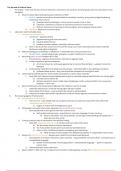Notizen
AP European History Textbook Outline Notes Unit 7: Nationalism, Socialism, Urban Society, Imperialism
- Kurs
- Hochschule
- Book
Complete textbook outline for John McKay's "A History of Western Society 10th Edition" for AP European History. Contains notes roughly from Chapter 22-25. Neatly organized information on Perspective and Political Developments (socialism and Karl Marx, 1848 Revolutions, etc), Urban Society (moderniz...
[ Mehr anzeigen ]



